Ch. 10 - A bittersweet adieu
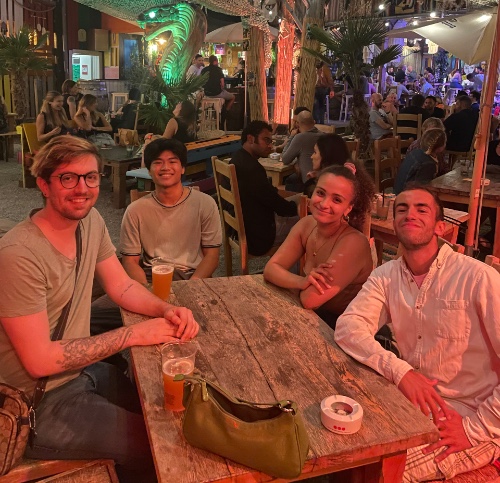 The week begins with "goodbye"s
The week begins with "goodbye"s
This weekend, I joined some others at Village du Soir, a complex of various bars, food booths, and a discotheque that is located on the outskirts of Geneva. Youseff brought Kyle, Isa, Noah, and I there after claiming it would be a crime for us to leave the country without visiting Village at least once. With everything from a beach bar to a upscale dance hall––this facility had it all. It was our ONE European clubbing experience, so we danced like it was the end of the world. We left many hours before closing time, which wasn't until 6 a.m., and rode the train home sweaty and exhausted.
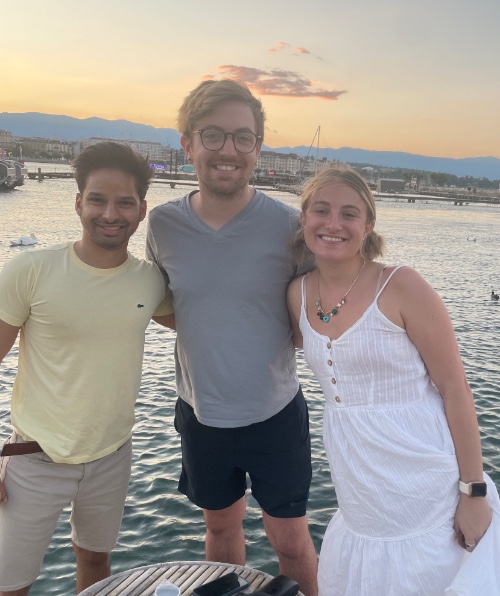
Kyle and I met up with Siddarth and his wife on Sunday evening to say our goodbyes. We all sat along the lake, talking about the future of the India Defense Manual and absentmindedly tossing table peanuts to the swans. Being able to research the Indian criminal justice system under the guidance of someone who can explain the day-to-day realities of the legal system, in addition to being formally educated in the country's black letter law has been an invaluable experience that has contributed greatly to my fascination in approaching domestic law through a comparative lens.
On Tuesday, Sanjee was so kind as to invite Kyle and I to his home in Rolle for dinner with his family. After work, Kyle and I took the train to the small wine-producing village. Sanjee met us at the train station and we spent the next two hours sitting in lawn chairs at the the town beach, which puts all of Geneva’s rocky shores to shame. On the way to his home, he drove us through vineyards, identifying different types of grapes and stopping the car before requiring us to try the different varieties. At dinner, we were joined by his wife, his two children, and a colleague who had previously worked at IBJ. The meal was unforgettable: pork curry served in a banana leave, 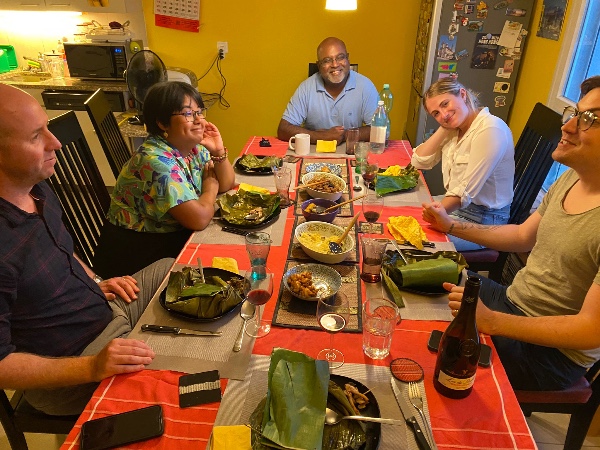 with accompaniments spread throughout the table’s center. Sanjee informed us that this was a traditional Sri Lankan meal and that, while it was customary to eat it with your hands, we could do whichever was more comfortable. For anyone who knows me or has seen me eat, you will know that this was music to my ears. Sanjee showed me the best way to scoop the food into your fingers before using your thumb to push it into your mouth. I was in heaven. After dinner, we had desert and talked for hours until it was time for Kyle and I to take the train back to Geneva.
with accompaniments spread throughout the table’s center. Sanjee informed us that this was a traditional Sri Lankan meal and that, while it was customary to eat it with your hands, we could do whichever was more comfortable. For anyone who knows me or has seen me eat, you will know that this was music to my ears. Sanjee showed me the best way to scoop the food into your fingers before using your thumb to push it into your mouth. I was in heaven. After dinner, we had desert and talked for hours until it was time for Kyle and I to take the train back to Geneva.
India Defense Manual – Special Populations
This week, I finished up my chapter on attorney-client relationships, working primarily on completing subsections on four special populations: women, LGBT, mentally ill, and victims of torture. Each of these contained elements that surprised me about Indian Law.
Women Defendants
The Supreme Court of India released a surprisingly modern opinion in relation to women accused of prostitution. In May of this year, the case of Budhadev Karmaskar v. State of West Bengal, the Court recognized sex work as a profession and issued several guidelines in relation to how sex workers should be treated by officials in the criminal justice system. In India, there had apparently been a pervasive issue of women accused of prostitution being abused by police officers and treated unequally. Although these are simply guidelines, perhaps this recent decision will serve as a catalyst for change in the system and will encourage the better treatment of sex workers by law enforcement officals.
LGBT Defendants
It wasn’t until 2018, in the case of Narjev Singh Johar v. Union of India Ministry that Section 377 of the Indian Penal Code, which criminalizes homosexuality, was ruled unconstitutional. Although same-sex relationships are no longer forbidden, the legislation has yet to afford any additional protections to the Indian LGBT population.
Four years prior, the Supreme Court recognized the “third gender” status of hijras (transgender people), and instructed that transgender people should be able to identify as the third gender or as the gender of their choosing. Unfortunately, this freedom was altered by the Transgender Persons (Protection of Rights) Act of 2019, which in essence made it more difficult for trans individuals to officially change the gender they identify as.
Mentally-Ill Defendants
Because India’s legal system is a remnant from colonial times, I should not have been suprised that they use the McNaughten Rules in cases of “insanity,” much like the United States does. These rules have been incorporated into Section 84 of the Indian Penal Code. As is the case in the United States, the burden rests on the defendant to prove that they were legally insane at the commission of an offense.
Victims of Torture
Custodial torture is a serious problem in India, where an average of 5 people die in in custody every day. While not all of these are victims of torture or violence, torture is routinely used by police to obtain information or induce confession. Arrestee’s can only remain in police custody for 24 hours before seeing a magistrate and being moved to judicial custody. From my research, it seems that many police departments see this short time frame as a burden that hinders their ability to obtain testimony from defendants. Unfortunately, the response to this time crunch is often "enhanced interrogation methods" (ie torture). Custodial torture, although punishable by up to 7 years, has almost never been successfully prosecuted.
The Grand Family Takes Geneva
On Wednesday, my parents and brother arrived to Geneva. I had long been awaiting their visit, which 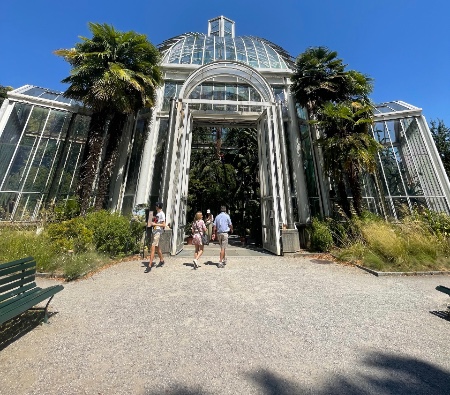 helped me avoid the approaching heartache that will come with leaving Europe.
helped me avoid the approaching heartache that will come with leaving Europe.
I spent my last three days in Geneva dragging them from one favorite spot to the next. We also went to
a couple of sites that I had not yet had the opportunity to visit–-Thursday, we visited the Conservatory and Botanical Gardens of Geneva. I took my mom and dad to Bains de Paquis afterwards and made them swim out with me to one of the floating docks. There we sat for a while—rocking with the lake’s small waves, my parents discussing what life would be like if they moved to Switzerland (a subject I will be repeatedly broaching with them). We met up with Kyle at Geneva’s famous Cafe du Soleil—home of the city’s best fondue—and ate until we were disgusted with ourselves. 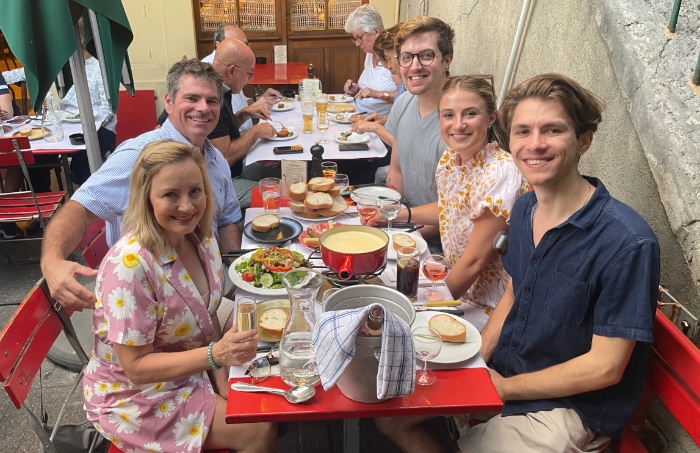
On Friday, we met with Kyle again at Jonction. My brother, Kyle, and I floated down the river time and time again, finally convincing my dad to join on our last trip. My mother sipped on a granita bought from the small beach bar. It seemed only right to spend my last day in Geneva at the place I frequented so often. Better yet, I got to spend it with not only my family, but also the person who accompanied me to that spot almost every time—Kyle. We were incredibly lucky to have been sent on this program together. Our time in Geneva has created a bond between us that fools everyone we meet into thinking we have known each other for all of our lives. All of the projects we were assigned together have been made that much easier, because of the amount of diligence and thought Kyle puts into every assignment. I am proud of the work product that we have submitted to IBJ, from our Afghanistan UN Proposal to the Indian Defense Manual. I will miss Geneva, my fellow interns, and IBJ with all of my heart—but I am incredibly grateful that I at least get to take a piece of this life back with me to the States.
Thank you for keeping up with my summer, I hope that you have enjoyed. I know I have.